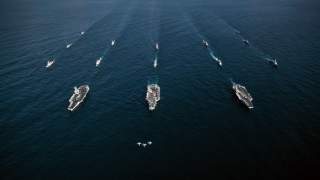China, the South China Sea and North Korea
The United States needs to diplomatically engage China over the South China Sea to reduce tensions, build trust, and achieve a quick and lasting solution to the North Korea problem.
The USS Carl Vinson’s port call to Danang, Vietnam, the first port call of its kind since the Vietnam War, is aimed at China’s posture in the South China Sea and will no doubt elicit criticism from Beijing. This comes at a time when the United States increasingly needs China’s help to resolve the North Korean nuclear weapons and missile issue. Given that China’s help may be necessary to resolve the North Korea nuclear crisis, Washington should not request China’s help to squeeze Pyongyang while simultaneously antagonizing Beijing in the South China Sea. Instead, the United States could be better served on the North Korea issue by engaging in further diplomacy before resorting to a more muscular foreign policy in the South China Sea vis-à-vis Beijing.
There are two problems with the current U.S. strategy in the South China Sea. Although the United States has sent other naval vessels on similar visits to Vietnam, the visit of an aircraft carrier is a power signal that Beijing will not overlook. An aircraft carrier is a tool of power projection and, for the United States, a machine that will make “[its] enemies shake with fear.” Therefore, China will view the visit of a U.S. aircraft carrier to Vietnam as a continued challenge to its sovereignty in the South China Sea and a further escalation of the ongoing competition with the United States for primacy in the Asia-Pacific.
Perhaps more importantly, American shows of force are unlikely to reverse or even halt China’s gains in the South China Sea. According to the Asia Maritime Transparency Initiative at the Center for Strategic and International Studies, China has almost completed its defensive and reconnaissance structures in the Spratly and Paracel Islands. These structures will be able to support dozens of combat aircraft and ships, as well as coastal artillery and other military supplies, which can assist Beijing in establishing an air defense identification zone above the South China Sea and in defending the sea lines of communication necessary for China’s economic growth.
Since U.S. military actions will only enflame tensions with China and fail to change the facts on the ground in the South China Sea, here is what the United States should do to encourage China to work better with us in resolving the North Korea crisis:
The first step is for the United States to declare support for the Association of Southeast Asian Nations (ASEAN)-China framework for a Code of Conduct for the South China Sea (COC). While the United States has acknowledged the framework, it has provided suggestions for the COC’s future without endorsing the mutually agreed framework. Declaring support for the joint ASEAN-Chinese effort would help reduce tensions between the United States and China. It would also signal that Washington values Beijing as a diplomatic partner that can make a meaningful contribution to the North Korea crisis negotiations.
In conjunction with announcing support for the COC’s framework, the United States ought to publicly reiterate its long-time policy of neutrality in the South China Sea dispute. Since China and the Chinese people care about public statements, reaffirming Washington’s neutrality in the South China Sea may not only reassure the Chinese government of the United States’ willingness to avoid confrontation, but also build trust for critical diplomacy regarding North Korea.
Finally, Washington should try to avoid confrontation with Beijing in the South China Sea. Every U.S. freedom of navigation operation (FONOPS) generates a rebuke from China. Certainly, freedom of navigation and international law are important national interests to the United States, but ensuring the safety and security of the American people from a North Korean nuclear missile should take priority. For now, reducing or eliminating FONOPS from the U.S. policy toolbox may be a prudent carrot to ascertain real help from Beijing in negotiating with and pressuring North Korea to end its provocations and, ideally, denuclearize.
For the short term, the North Korea nuclear crisis is the main foreign policy concern of the United States. Like it or not, China’s help and input in the resolution of the crisis will likely lead to a more stable outcome. Washington cannot expect to antagonize Beijing in the South China Sea while asking for assistance on the Korean Peninsula. Thus, the United States needs to diplomatically engage China over the South China Sea to reduce tensions, build trust, and achieve a quick and lasting solution to the North Korea problem. If diplomacy fails, only then should Washington take more forceful actions to assert its interests.
Quinn Marschik is the assistant director at the Center for the National Interest.
Image: Reuters
Recommended:
Why North Korea's Air Force is Total Junk

